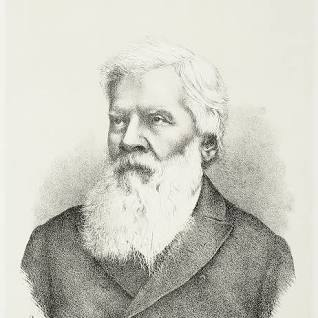Well I am done with Australian wonders and now move on to famous Australian's through the years. I am kicking this off with Sir Henry Parkes. Why Sir Henry Parkes well because my mum was born in the town of Parkes.
He was born in May 1815 in a place called Canley which is now a suburb of Coventry in Warwickshire in England
Sir Henry Parkes, GCMG was a colonial Australian politician and longest non-consecutive Premier of the Colony of New South Wales, the present-day state of New South Wales in the Commonwealth of Australia from 1872 to 1891.
.After the loss of their two children at an early age and a few unsuccessful weeks living in London, Parkes and his wife emigrated to Australia arriving in Sydney on the 25 July 1839.
During his early years in Australia, Parkes took an interest in political issues. Most notably, he joined the growing movement in the colony for self-governance. This was already a major political issue; the New South Wales Legislative Council had been reformed in 1843 to include elected members for the first time.
He also became an opponent of the transportation of convicts to Australia and a supporter of land reform.
In December 1850, Parkes founded the Empire Newspaper which at first a broadsheet only published weekly, it soon became a daily. Parkes was loyal to the British Empire, but also wanted critics of the establishment to have a voice. As a result, the paper became critical of the incumbent Governor Charles Augustus Fitzroy and the rest of the colonial government.
He also attacked William Wentworth's plans to introduce self-governance because it proposed an unelected Legislative Council and a restrictive franchise for the elected Legislative Assembly. The proposal was eventually passed after some amendments to make it more democratic. Some years later, Parkes said that, "in the heated opposition to the objectionable parts of Mr Wentworth's scheme, no sufficient attention was given to its great merits".
He began his political career quietly. He was with the minority faction in the Legislative Council, and he and his political allies could afford to bide their time until the new constitution came into force. His workload at the Empire office was extremely heavy, and in December 1855 he announced his intention of retiring from parliament. He was persuaded to alter his mind, and a month later he stood as a liberal candidate for Sydney City in the NSW Legislative Assembly.
After he was relieved of his heavy work on the Empire, which was continued in other hands, Parkes stood for parliament and was elected for East Sydney on the 10 June 1854.
He stood as an independent candidate, but in the list of candidates elected he was described by the Sydney Morning Herald as a "radical". He was generally in favour of Sir John Robertson's land policy, of the extension of education, and of free trade.
He was a strong supporter of free trade, immigration programmes and education reforms. He was also strongly in favour of developing manufactures as he was of encouraging agriculture. He introduced laws that gave the Government the power to employ teachers and create public schools, abolished government funding to religious schools and improved prisons.
Parkes convened the 1890 Federation Conference of February 1890 and may be considered the first real step towards Federation. When the convention met on 2 March 1891 Parkes was appointed as its president.
He has had many things named after him.





That was truly interesting. All of it. He was a man of much intellect and inspiration.
ReplyDeleteDoing the post I have learnt a lot about him
DeleteInteresting. I'm embarrassed to say I know little of Australian History.
ReplyDeleteDon't be embarrassed as you are not alone, I am pleased you liked the post
DeleteSounds like he did a lot of good! :)
ReplyDeleteIt does
DeleteI knew who he was but not the extent of his progressive ideas . What a great man . I wonder whether he was influenced by The Chartists who were causing "trouble" in England at the time . Some were transported to Australia ands were influential in our early history and the relative freedom of opportunity which marked our beginnings under white settlement .
ReplyDeleteI wonder too what his thoughts were regarding he dispossession of the Aboriginal population .
Yes there is a lot more that could be written about him but I didn't want to bore people
DeleteSounds like he was a good man.
ReplyDeleteI agree
DeleteSounds a lot like "radical" in his case equated to "common sense". Very interesting!
ReplyDeletePleased you liked the post
Delete